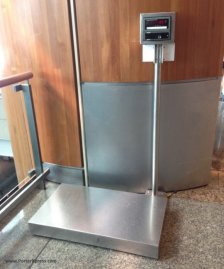Airport weighing scales

With airlines charging hefty fees for overweight bags, the small difference between a 49-pound suitcase and a 51-pound one could add up to a big hit on your wallet. (Delta, for instance, charges $90 each way to check a bag weighing 51 to 70 pounds.) But what if your bag’s excess weight isn’t caused by what you’ve packed, but by a quirk of the luggage scale at your airport?
A reader wrote to us a few days ago on this very topic: “An airline recently tried to charge an enormous fee for [a suitcase that was] five pounds over [the weight limit]. We moved one very light fleece vest to another piece and ended up seven pounds under. That vest did not weigh 12 lbs; maybe it weighed 2. If they are going to charge such prices, shouldn’t they have to calibrate the scales?”
Unfortunately, a recent report from CBS Los Angeles shows that this sort of discrepancy is not unheard of. While most of the scales tested in the report passed inspection, one faulty scale at Los Angeles International Airport (LAX) displayed a reading of 53 pounds for a 50-pound weight, and 109 pounds for a 100-pound weight. Although scales at airports are supposed to be calibrated on a regular basis, missed maintenance or normal wear and tear can sometimes lead to flawed readings.
So what’s a traveler to do? We recommend purchasing your own small luggage scale to use at home when packing; you can pick one up at a travel supply store for $10 – $20. These offer a quick way to make sure you’re not getting too close to your airline’s weight limit. Just be sure to allow for a little variation between your scale and the one at the airport. (Is your suitcase tipping the scale at 48 pounds? It’s time to lose that extra guidebook or pair of boots.)
Once at the airport, if you suspect that a scale is inaccurate, ask the airline employee to test your bag on another scale nearby.
Related posts:

 One of the more cost-effective measurements in a paper mill is that which monitors the flow of pulp stock into the head box of the paper machine. The stock level…
One of the more cost-effective measurements in a paper mill is that which monitors the flow of pulp stock into the head box of the paper machine. The stock level… Why is taking all the tricks called a boston in pinochle what are kegel exercises How to change administrator on windows 10? In what order should you learn tricks…
Why is taking all the tricks called a boston in pinochle what are kegel exercises How to change administrator on windows 10? In what order should you learn tricks… Overview Marel Marine Scales are specifically designed for use on board fishing vessels and factory trawlers. This cost-effective series of scales ranges from the…
Overview Marel Marine Scales are specifically designed for use on board fishing vessels and factory trawlers. This cost-effective series of scales ranges from the… How long to air fry french fries what does fafsa stand for What does it mean when ypu use alocohol and the tips of your fingers turn white Who raps bitches aint…
How long to air fry french fries what does fafsa stand for What does it mean when ypu use alocohol and the tips of your fingers turn white Who raps bitches aint… Globe s portion control scales can be used in a wide spectrum of applications from delis and pizza parlors, to bakeries and restaurants, or any establishment where…
Globe s portion control scales can be used in a wide spectrum of applications from delis and pizza parlors, to bakeries and restaurants, or any establishment where…